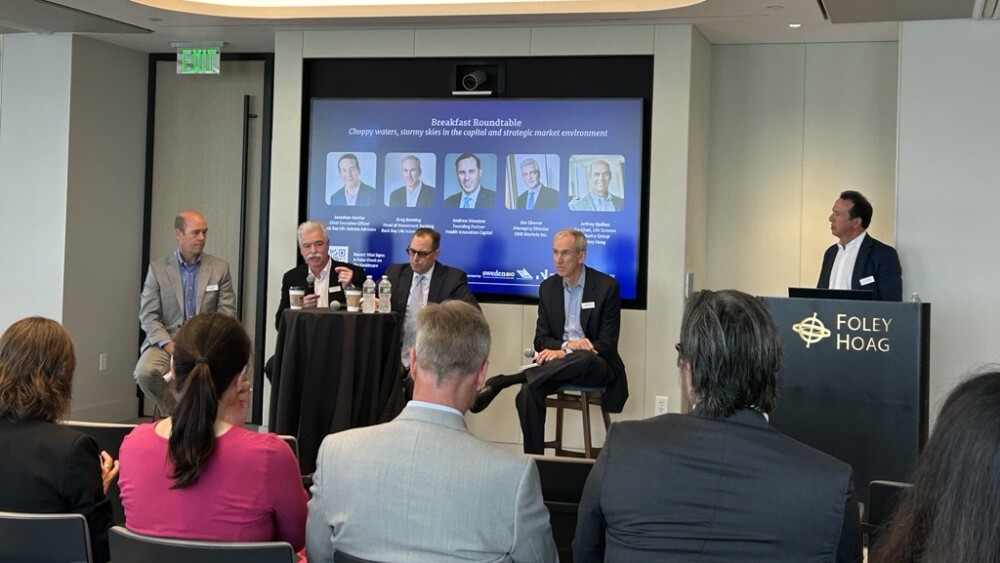Acceleron announced preliminary results from the ongoing Phase 2 trials with luspatercept in patients with lower-risk myelodysplastic syndromes (MDS) at the 59th Annual Meeting of the American Society of Hematology (ASH) in Atlanta, Georgia.
- Preliminary results show treatment with luspatercept increases hemoglobin and achieves durable red blood cell transfusion independence in patients with lower-risk myelodysplastic syndromes -
- Conference call and webcast to be held on Monday, December 11th at 7:00 a.m. EST -
CAMBRIDGE, Mass.--(BUSINESS WIRE)--Acceleron Pharma (NASDAQ:XLRN), a leading biopharmaceutical company in the discovery and development of TGF-beta therapeutics to treat serious and rare diseases, today announced preliminary results from the ongoing Phase 2 trials with luspatercept in patients with lower-risk myelodysplastic syndromes (MDS) at the 59th Annual Meeting of the American Society of Hematology (ASH) in Atlanta, Georgia. Luspatercept is being developed as part of a global collaboration between Acceleron and Celgene.
“As the Phase 2 results in MDS mature, we are excited to see luspatercept achieving a clinically meaningful erythroid response in over 50% of patients. Luspatercept continues to provide long-term benefit to multiple patients now nearing three years on treatment. These results further reinforce luspatercept’s potential to be a transformative treatment option for patients living with lower-risk MDS,” said Habib Dable, President and Chief Executive Officer of Acceleron. “We look forward to the upcoming MEDALIST and BELIEVE Phase 3 trial top-line data readouts in mid-2018, and we and Celgene continue to make considerable progress toward initiating the COMMANDS Phase 3 trial during the first half of 2018.”
Phase 2 Results
A total of 99 lower-risk MDS patients have been treated with therapeutic dose levels of luspatercept (≥ 0.75 mg/kg) in the ongoing Phase 2 trials.
- 53% (52 of 99 patients) achieved a clinically meaningful erythroid response of an increase in hemoglobin or reduction in red blood cell (RBC) transfusion burden as per the International Working Group’s Hematologic Improvement Erythroid (IWG HI-E) response criteria.
- 43% (29 of 67 patients) with an RBC transfusion burden at baseline of ≥ 2 units per 8 weeks achieved RBC transfusion independence (RBC-TI) for ≥ 8 weeks.
- In an updated analysis of the 23 RBC-TI responders previously reported at EHA 2017, the median duration of treatment increased to 19.0 months from 14.7 months. The current duration of treatment for RBC-TI responders ranges from 2.8 months to 37.3 months.
- Patients with a low transfusion burden at baseline (< 4 RBC units per 8 weeks and hemoglobin < 10 g/dL) demonstrated a clinically meaningful increase in hemoglobin for up to 34 months, with multiple ongoing.
The results presented at ASH 2017 confirm and extend previously reported results across the lower-risk MDS patient subpopulations, showing erythroid responses regardless of prior use of erythropoiesis-stimulating agents (ESA), baseline erythropoietin (EPO) levels, and ring sideroblast (RS) status.
Phase 2 Safety Summary
A total of 106 lower-risk MDS patients have been treated with luspatercept in the ongoing Phase 2 trials (all dose levels).
- The majority of adverse events (AEs) were Grade 1 or 2. AEs possibly or probably related to study drug that occurred in at least three patients during the studies were headache, hypertension, fatigue, bone pain, diarrhea, arthralgia, injection site erythema, myalgia, and edema peripheral.
- Grade 3 non-serious AEs possibly related to study drug were ascites, blast cell count increase, blood bilirubin increase, bone pain, hypertension, mucosal inflammation, platelet count increase, and pleural effusion. These Grade 3 non-serious AEs occurred in seven individual patients with one patient reporting both the ascites and pleural effusion.
- Serious AEs (SAEs) possibly related to study drug were general physical health deterioration, muscular weakness, musculoskeletal pain, and myalgia. These SAEs occurred in three individual patients with one patient reporting both the muscular weakness and musculoskeletal pain.
The MEDALIST trial, a global Phase 3 trial of luspatercept in lower-risk MDS patients, is fully enrolled with top-line results expected in mid-2018. The MEDALIST trial enrolled patients who are RS-positive, RBC transfusion dependent, and are ESA-refractory or ESA-treatment ineligible, based on EPO levels greater than 200 units per liter at baseline. Acceleron and Celgene plan to initiate the COMMANDS Phase 3 trial in first-line, lower-risk MDS patients during the first half of 2018.
The MDS clinical poster presentation is available under the Science page of the Company’s website at www.acceleronpharma.com.
Luspatercept is an investigational product that is not approved for use in any country.
Acceleron ASH Conference Call Information
Acceleron will host a conference call and live webcast to discuss data presented at the ASH meeting on December 11, 2017, at 7:00 a.m. EST.
Individuals can participate in the conference call by dialing 877-312-5848 (domestic) or 253-237-1155 (international) and refer to the “Acceleron ASH 2017 Update.”
The webcast will be accessible under "Events & Presentations" in the Investors/Media page of the Company's website at www.acceleronpharma.com.
A replay of the webcast will be available approximately two hours after the event.
About the Ongoing MDS Phase 2 Studies
Data from two Phase 2 trials were presented at the conference: the base study in which patients received treatment with luspatercept for three months and the long-term extension study in which patients who completed the base study may receive treatment with luspatercept for up to an additional five years. In both the three-month base study and the long-term extension study, lower-risk MDS patients were enrolled and treated with open-label luspatercept, dosed subcutaneously once every three weeks.
The outcome measures for the trials included the proportion of patients who had an erythroid response (IWG HI-E) or achieved RBC transfusion independence (RBC-TI). IWG HI-E was defined as hemoglobin increase ≥ 1.5 g/dL sustained for ≥ 8 weeks in patients with < 4 units RBC / 8 weeks transfusion burden at baseline and hemoglobin levels below 10 g/dL. For patients with a ≥ 4 units RBC / 8 weeks transfusion burden at baseline, erythroid response was defined as a reduction of ≥ 4 units RBC sustained for ≥ 8 weeks. RBC-TI was defined as receiving no RBC transfusions for ≥ 8 weeks in patients with a ≥ 2 units RBC / 8 weeks baseline transfusion burden.
About Luspatercept
Luspatercept is a modified activin receptor type IIB fusion protein that acts as a ligand trap for members of the TGF-beta superfamily involved in the late stages of erythropoiesis (red blood cell production). Luspatercept is a first-in-class erythroid maturation agent (EMA) that regulates late-stage erythrocyte (red blood cell) precursor cell differentiation. This mechanism of action is distinct from that of erythropoiesis stimulating agents (ESAs), which stimulate the proliferation of early-stage erythrocyte precursor cells. Acceleron and Celgene are jointly developing luspatercept as part of a global collaboration. Phase 3 clinical trials are underway to evaluate the safety and efficacy of luspatercept in patients with myelodysplastic syndromes (the MEDALIST trial) and in patients with beta-thalassemia (the BELIEVE trial). A Phase 3 trial is being planned in first-line, lower-risk, myelodysplastic syndromes patients (the COMMANDS trial). For more information, please visit www.clinicaltrials.gov.
About Acceleron
Acceleron is a Cambridge-based, clinical-stage biopharmaceutical company dedicated to the discovery, development, and commercialization of therapeutics to treat serious and rare diseases. The Company's leadership in the understanding of TGF-beta biology and protein engineering generates innovative compounds that engage the body's ability to regulate cellular growth and repair.
Acceleron focuses its research and development efforts in hematologic, neuromuscular, and pulmonary diseases. In hematology, the Company and its global collaboration partner, Celgene, are developing luspatercept for the treatment of chronic anemia in myelodysplastic syndromes, beta-thalassemia, and myelofibrosis. Acceleron is also advancing its neuromuscular franchise with two distinct Myostatin+ agents, ACE-083 and ACE-2494, and a pulmonary program with a Phase 2 trial of sotatercept planned in pulmonary arterial hypertension.
For more information, please visit www.acceleronpharma.com. Follow Acceleron on Social Media: @AcceleronPharma and LinkedIn.
Forward-Looking Statements
This press release contains forward-looking statements about the Company's strategy, future plans and prospects, including statements regarding the development of the Company's compounds, the timeline for clinical development and regulatory approval of the Company’s compounds and the expected timing for reporting of data from ongoing clinical trials. The words "anticipate," "believe," "could," "estimate," "expect," “goal”, "intend," "may," "plan," "potential," "project," "should," "target," "will," "would," and similar expressions are intended to identify forward-looking statements, although not all forward-looking statements contain these identifying words.
Actual results could differ materially from those included in the forward-looking statements due to various risks and uncertainties, including, but not limited to, that preclinical testing of the Company's compounds and data from clinical trials may not be predictive of the results or success of ongoing or later clinical trials, that the development of the Company's compounds will take longer and/or cost more than planned, that the Company or its collaboration partner, Celgene, will be unable to successfully complete the clinical development of the Company’s compounds, that the Company or Celgene may be delayed in initiating, enrolling or completing any clinical trials, and that the Company's compounds will not receive regulatory approval or become commercially successful products. These and other risks and uncertainties are identified under the heading "Risk Factors" included in the Company's most recent Annual Report on Form 10-K, and other filings that the Company has made and may make with the SEC in the future.
The forward-looking statements contained in this press release are based on management’s current views, plans, estimates, assumptions and projections with respect to future events, and the Company does not undertake and specifically disclaims any obligation to update any forward-looking statements.
View source version on businesswire.com: http://www.businesswire.com/news/home/20171210005077/en/
Contacts
Acceleron Pharma Inc.
Todd James, IRC, 617-649-9393
Vice President, Investor Relations and Corporate Communications
or
Candice Ellis, 617-649-9226
Manager, Investor Relations and Corporate Communications
or
Media:
BMC Communications
Brad Miles, 646-513-3125
Source: Acceleron Pharma





